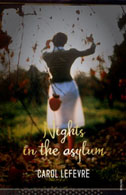 | Carol Lefevre NIGHTS IN THE ASYLUM Vintage, 319 pp. Source: review copy Review by Perry Middlemiss |
You could be forgiven for thinking that a new genre is emerging in Australian literary fiction: the genre of "escape" fiction. Not escapist, there is certainly enough of that around, but "escape" - the act of leaving a bad place in the hope of reaching somewhere better, or at least acceptable. Grace by Robert Drewe would fit, with its protagonist fleeing an inner-city stalker for the wilds of north-western Australia; and there are escapes, of sorts, in both Dreams of Speaking by Gail Jones and Candle Life by Venero Armanno.
Escapes, in this context, should not be confused with "journeys"; the two are very different. Epic fantasy utilises the concept of the physical journey as a means of transforming the protagonists from their initial state of innocence to hero status at journey's end. The literary fiction equivalent is the "road" novel, where the end is less important than the act of getting there, and the life changing events that are experienced along the way. This new "escape" genre almost dispenses with the journey, preferring to emphasise the arrival, or post-arrival, aspects of the story.
Such is certainly the case with Nights in the Asylum, a first novel by Australian writer Carol Lefevre. In this book, three very different characters find themselves in an old partly dilapidated mansion in an outback mining town. Each is fleeing a particular form of abuse and, while their respective journeys are described in the novel, "how" they got to the house seems of little importance. Indeed, very much of lesser import than the "why".
Miri, the novel's main character, has left her husband in Sydney after the death of their university-aged daughter, Alice. The triple blow of her daughter's psychiatric illness, followed by Miri's discovery of her husband's infidelities, and then the daughter's death, prove too much for her to cope with and she travels back to the mining town where she was born; back to the house her grandfather built for her Cuban grandmother. Along the way she picks up the hitch-hiking Aziz, a silent man of little English, who, we later find, has somehow escaped from an immigration detention centre and who seems intent on nothing more than never going back. Although the house is supposed to be locked up and empty, Miri finds local townswoman Suzette and her baby daughter hiding from her policeman husband in one of the upstairs bedrooms.
The arrival of the three in this house precipitates another journey in each of them. Aziz is trying to survive in a country he doesn't understand, fleeing the abuse that only a state can inflict on a person, searching for freedom. Suzette is also searching for freedom, but first has to discover the inner courage to escape her physically and mentally abusive husband in order to save her and her daughter's lives.
Miri initially thinks she has reached the end of her journey by returning to where she began. Yet this is just another starting off point for her. She was unable to save her daughter from herself, but discovers that she may just be able to save the others and, in the process, undergo a form of redemption.
It's a pretty good setup, all in all. It allows the author to explore three very different worlds, and three very different lives which just happen to intersect in one old house. Lefevre examines the intersecting story-line strands in chapters told from the different points-of-view of the main and subsidiary characters, in present time and in flashback, building up the layers of novel as she goes. Handled poorly this can be a recipe for disaster as the reader's focus changes too often and with too little delineation between strands. Lefevre doesn't fall into that trap and the overall effect of this technique adds, rather than detracts, from the final result.
The only quibble I have with the book relates to its ending. Suzette's husband comes looking for her and is suspicious of Miri, seemingly all alone in this great house. The presence of Aziz and Suzette becomes known to some sympathetic neighbours, but the more people who know of them only increases the likelihood that the police will be informed. Lefrevre decreases the size of her chapters and sentences, instilling a sense of urgency into the formulation of an escape plan, and ramping up the tension as the police spiral in towards them. And yet, at the end, it finishes in a rather off-hand manner. The reader isn't looking for a final "showdown" or resolution as in a mystery novel, but the final scene, of the main part of the novel, feels rather like a let-down.
The last part of the book consists of nine very short chapters describing a set of "undated photographs". You are led to believe these show the novel's protagonists at some time in the future, after the end of the novel, though I found the effect too obscure to render much enlightenment. Maybe if I'd paid more attention to the description of the characters or their surroundings during the course of the book I might have been better placed to appreciate these appendices. It's asking a lot of a reader to be that attentive.
I should say that I'm talking from my own perspective and failings here. In general, the book shows a talent for character, timing and place that augurs well for the future. My misgivings about various parts of the book can probably be explained by the fact that this is a first novel. If future efforts improve on this then they will be very good indeed.
